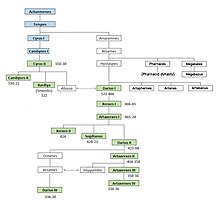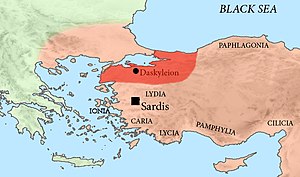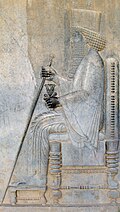Megabazus
Megabazus | |
|---|---|
 Megabazus was son of Megabates.[1] | |
| Native name | Bakabadus |
| Allegiance | Achaemenid Empire |
| Battles / wars | European Scythian campaign of Darius I Darius' Thracian campaign Unknown others |
| Children | Megabates[2] Oebares II Bubares Pherendates[3] |
| Relations | Megabates (father) |

Megabazus (Old Persian: Bagavazdā or Bagabāzu, Ancient Greek: Μεγαβάζος), son of Megabates, was a highly regarded Persian general under Darius, to whom he was a first-degree cousin. Most of the information about Megabazus comes from The Histories by Herodotus.
Scythian campaign (513 BC)
Megabazus led the army of the Persian King Darius I in 513 BC during his European Scythian campaign. After this had to be discontinued without result, Megabazos was left as commander-in-chief of an 80,000-man army in Europe, with the mission of subjugating the Greek cities on the Hellespont. The Persian troops first subjugated gold-rich Thrace after capturing Perinthos and the coastal Greek cities, and then defeated the powerful Paeonians, many of whom he deported to Phrygia.[6][7]
Subjugation of Macedon
Finally, Megabazus sent envoys to Amyntas I, king of Macedon, demanding acceptance of Persian domination, which the king accepted.[8][7] Megabazus received the present of "Earth and Water" from Amyntas, which symbolised submission to the Achaemenid Emperor.[9] Amyntas then acted as hyparch to Darius I.[10]
Disagreements arose when the members of the Persian delegation insulting the Macedonians by fraternising with their wives. The Macedonian prince Alexander I reacted to this by murdering several Persian diplomats and their followers. The conflict was later settled with the marriage of one of Megabazus' sons, Bubares, to the Macedonian princess Gygaia, a daughter of Amyntas.[9][1]
After his return to Asia Minor, Megabazus received the governorship of the province (satrapy) of Hellespontine Phrygia and was based in its capital Daskyleion.
Rivalry with Histiaeus
Megabazus was suspicious of Histiaeus, tyrant of Miletus, and advised Darius to bring him to the Persian capital of Susa to keep a closer eye on him. His suspicions turned out to be well founded as Histiaeus provoked a revolt in the town of which he was formally in charge and later sided with the Greeks against Persia. The successor to Megabazus' command was Otanes (son of Sisamnes).[11]
Family
According to Herodotus (Herodotus 6.33) Oebares was a son of Megabazus, and became satrap of Daskyleion (Hellespontine Phrygia) in 493 BC.[12][1]
Megabates was another son of Megabazus. He was a commander of the Achaemenid fleet that sailed against Naxos in 500/499 BC. He also was Satrap of Daskyleion in the early 470s.[1][13]
Sons
- Oebares: became satrap of Daskyleion c. 493 BC
- Bubares: managing engineer of the Athos Canal of Xerxes I
- Megabates: Achaemenid fleet commander and satrap of Daskyleion
- Pherendates: died c. 485 BC while satrap of Egypt.
References
- ^ a b c d Foundation, Encyclopaedia Iranica. "Welcome to Encyclopaedia Iranica". iranicaonline.org.
- ^ "Megabazus - Livius". www.livius.org.
- ^ "Encyclopaedia of the Hellenic World, Asia Minor". asiaminor.ehw.gr.
- ^ "DNa - Livius". www.livius.org.
- ^ Adams 2010, pp. 343–344
- ^ Roisman, Joseph; Worthington, Ian (7 July 2011). A Companion to Ancient Macedonia. ISBN 9781444351637. Retrieved 17 December 2014.
- ^ a b "Persian influence on Greece (2)". Retrieved 17 December 2014.
- ^ Roisman, Joseph; Worthington, Ian (7 July 2011). A Companion to Ancient Macedonia. ISBN 9781444351637. Retrieved 17 December 2014.
- ^ a b Waters, Matt (2014). Ancient Persia: A Concise History of the Achaemenid Empire, 550–330 BCE. Cambridge University Press. p. 83. ISBN 9781107009608.
- ^ King, Carol J. (2017). Ancient Macedonia. Routledge. p. 27. ISBN 9781351710329.
- ^ "Perseus Under Philologic: Hdt. 5.25.1".
- ^ "LacusCurtius • Herodotus — Book VI: Chapters 1‑42". penelope.uchicago.edu.
- ^ Thucydides, 1.129; Herodotus, 5.32-35, 6.32



